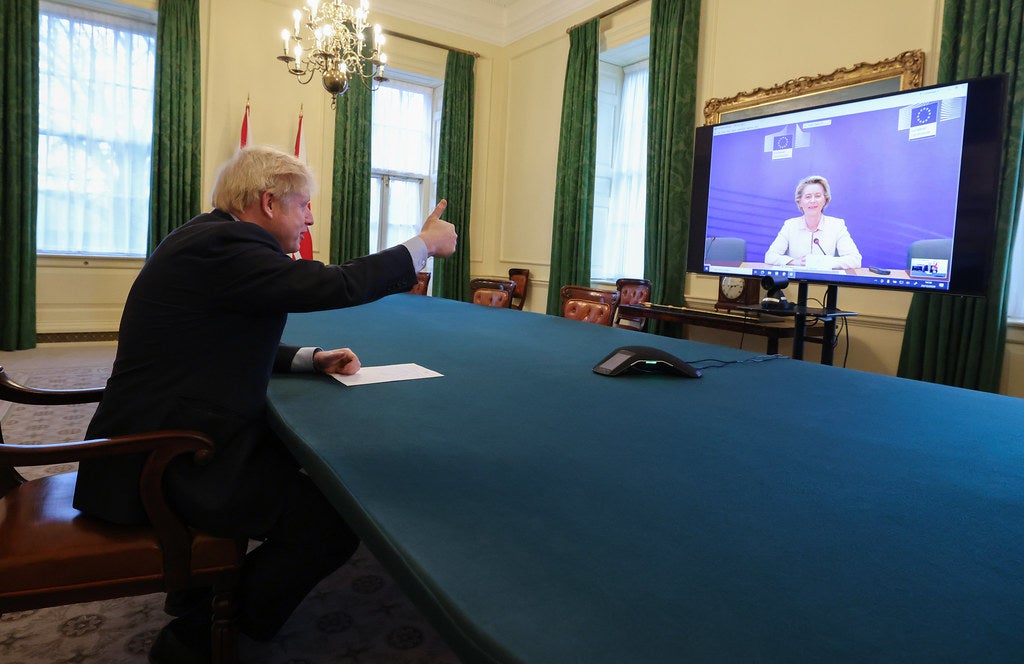Analysis of the EU deal confirms that even Boris Johnson accepts the virtues of cooperation
Editorial: What is striking about the text is the extent to which it reinvents many aspects of membership of the European Union

Now that the text of the trade deal has been published, we can see how, line by line, page by page, the case for European cooperation is made again from first principles.
The Independent has no wish to refight old battles. Indeed, we recognise that, as we have left the European Union, it is better that our departure is completed in a less damaging way. And the provisions of the “trade and cooperation agreement” are significantly better than what is by now the only practical alternative, that of trading on the distress terms of the World Trade Organisation’s default rules.
Given the political constraints within which they worked, the British negotiating team – and indeed their EU counterparts – did well to agree such an important document in the time available.
Yet the agreement reads like the opening – very long – chapter in the next stage of the neverending story of these islands’ relationship with the common endeavour that unites most of the European continent. Every aspect of that relationship is going to be renegotiated constantly over the coming decades. This document is merely a temporary codification of the terms on which we choose to make our economic interaction with our neighbours more difficult.
As the legal and trade experts go through the text, they are struck by the gaps as much as by the scaffolding that is in place. There will be many more discussions, negotiations and agreements, on data sharing, intelligence on criminals, financial services, reciprocal healthcare and fish.
What is striking about the sections between the gaps, though, is the extent to which they reinvent so many aspects of EU membership. It is almost as if the British government, having sought to deny the interdependence of nations in theory, is forced to accommodate it in practice.
Thus we have thrown off the shackles – as some British people see them – of EU law only to bind ourselves by 1,246 pages of new statutes. To which will be added annexes, protocols, memorandums of understanding, further sectoral agreements and even case law.
We have cast off the chains of the Court of Justice of the EU only to forge new ones, an arbitration tribunal that will adjudicate on disputes, a tribunal that will in time establish precedents and guiding principles just like any other court.
The trade and cooperation agreement will have its own executive institutions. Instead of the EU Council, there will be a Partnership Council, with co-chairs appointed by either side, meeting “alternately in Brussels and London”. Instead of the European Commission, the council will be served by a secretariat, which by the laws of bureaucracy will develop a life and an ethos of its own.
What is more, we have removed ourselves from the democratic institution of the EU, the European parliament, only to go back to its original form, that of a “parliamentary assembly” – that is, a forum to bring together parliamentary representatives from the constituent parts of the UK-EU partnership.
Naturally, one of the criticisms of the European Community was its inadequate democratic oversight, and so the idea of direct elections to the European parliament was born. Perhaps that will happen to the “Parliamentary Partnership Assembly” in time.
It should be no surprise that Boris Johnson and his Vote Leave government should learn, as we are leaving, the virtues of partnership. Switzerland, Norway and Iceland have tried to keep their distance from the political structures of the EU and yet find it in their interest to remain tightly bound to the benefits and obligations of the single market – in Switzerland’s case in a highly devolved referendum-based democracy.
When British voters put their cross in the box marked “Leave”, they were agreeing to a lot of terms and conditions that they hadn’t read.
Now it is time to read the small print and to recognise, as even Mr Johnson has done, the virtues of cooperation and even a high degree of integration with the huge zone of freedom on our doorstep.





Join our commenting forum
Join thought-provoking conversations, follow other Independent readers and see their replies
Comments